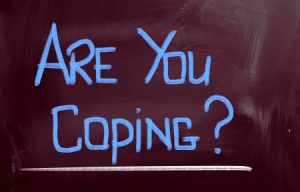Coping is an essential element in human response to loss, grief and stress. Even at the most simple levels of existence, coping and adaptation to change is critical to survival. Human beings cope with loss and mental stress through a variety of ways. Initially, sometimes, the way one copes may not be the best way but it initially allows the person to retreat, review and respond but many negative coping habits over a long period of time can become pathological. Grief Counselors can offer basic grief support to help individuals avoid the pitfalls of bad coping.
Healthy coping is possible when the person is able to understand the situation and react to it in adaptive way that is not maladaptive or destructive. When one responds socially or emotionally in ways that attempt to numb the pain consistently. Avoidance is one of the most common themes of negative coping. While initially it may be beneficial, overtime, the the short fix to numb oneself and avoid things that incite pain, grief, shame, guilt or any emotion associated with the loss are key signs of negative coping. Negative coping may ease the initial pain, but it does very little in healing the person over time. It becomes an obstacle to healing.

What’s Your Grief offers a very insightful article on negative coping in their article, “Grief and Negative Coping” by Eleanor Haley. The article looks at what negative coping is and various examples of the behavior in regards to work, socializing, and parenting. It also lists other ways individuals attempt to temporarily cover the pain. Haley states,
“Negative coping is like emotional aspirin. It numbs the pain temporarily, but the pain reappears once it wears off. Often these patterns of behavior end up making your stress worse because they are unhealthy and require a lot of effort to maintain. Moreover, they prevent you from effectively processing your emotions and experiences, which can lead to a prolonged sense of anxiety and emotional pain.”
“Grief and Negative Coping”. Eleanor Haley. What’s Your Grief
To read the entire article, please click here
Commentary
Haley points out three interesting ways adaptive versus maladaptive coping manifests in work, socialization and parenting. Many individuals will either relinquish responsibility or drown themselves in responsibility to avoid the pain of a loss. Haley illustrates how this occurs in work, life and parenting.

In working, some individuals will work long and exhausting hours, while others may not show up for work. Adaptive coping is the ability to handle the loss but still after a few days, show the ability to function within the work place. Likewise, with parenting, grieving parents may ignore their responsibilities with their children or over indulge in their life to cover the loss. Likewise, in the social sphere, one can see the same type of extremes with individuals who instead of normal engagement become a recluse in the house for weeks or turn to partying every night. All the extremes in these scenarios are examples of negative coping. In it, the individual is trying to mask the issue at hand by avoiding it through excessive work or depressive avoidance of life.
In addition, many negatively cope through the use of substance abuse. This in turn becomes a difficult endeavor to continue as one constantly seeks the numb feeling associated with the substance or drug. This can lead to greater issues with addiction and loss of relationships. Commonly, individuals who suffer may have a few days alone or have a couple drinks, but this type of abuse is far longer and in a greater scope. It is not a way to escape the initial pain to retreat and review, but is a permanent new life style that prohibits any response to the true problem and hence preventing any type of healing.
Other examples of negative coping include over-eating and food indulgences, as well as isolation, fighting, avoidance of places, people and things and any type of destructive behavior.
Instead of seeking a numbing experience, individuals need to finally respond to their grief. They need to learn to adjust to the new normal even if painful. This involves adjusting emotionally but also not allowing it to sidetrack life itself. Positive coping looks for cognitive reframing of the situation and an understanding of how the loss or stress plays a role in the overall story of life. Positive coping looks at ways to incorporate the loss into one’s life without ignoring it or harming oneself financially, emotionally or physically. It involves healthy decisions.
Some examples of healthy coping include meditation, prayer, exercise, memorializing the loss, discussing the loss with family and friends, and reframing the loss and finding its place of meaning and construction within one’s own life narrative.
Conclusion

It is natural to wish to avoid unpleasant things. It is natural to avoid pain. Humans are wired to react negatively to pain and instead look away. When emotionally hurt, one wishes to ignore the pain and avoid it. Individuals look to numb it instead of sometimes facing the horrendous lost. While initially this is natural, hence why many individuals deny first bad news, overtime, this can become detrimental to healing. The quick fix of avoidance and bad coping may numb something temporarily but the pain will always return. Eventually, one must perform grief work and cope in a healthy way to ever find healing itself.
Please also review AIHCP’s Grief Counseling Certification program and see if it meets your academic and professional goals and needs. The program is online and independent study and open to qualified professionals seeking a four year certification in Grief Counseling.
Additional Resources
“6 Coping Skills to Work Through Grief”. Hope Gillette and Sandra Silva Casabianca. July 21, 2021. PsychCentral. Access here
“How to overcome grief’s health-damaging effects”. February 15th, 2021. Harvard Health Publishing. Access here
“The Process of Coping with Grief and Loss”. Isaac P. Tourgeman Ph.D., M.S. September 1st, 2021. Psychology Today. Access here
“Grief: What’s Normal, What’s Not — and 13 Tips To Get Through It”. July 27th, 2018. HealthEssentials. Cleveland Clinic. Access here
